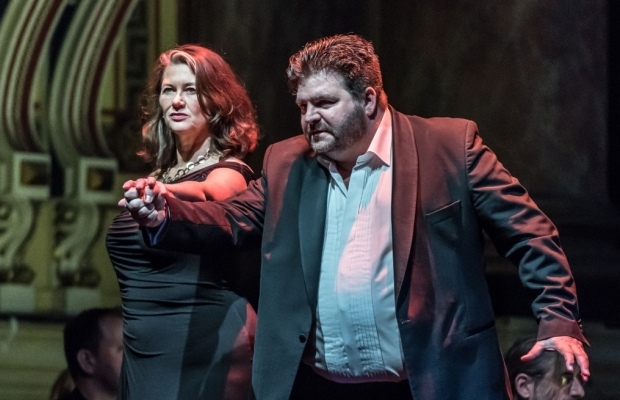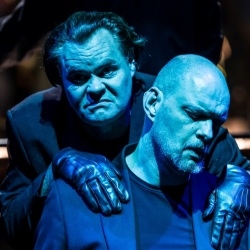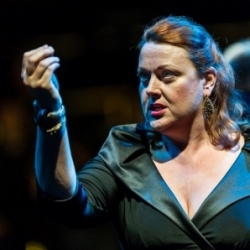Der Ring des Nibelungen (Leeds Town Hall and tour)

© Clive Barda 2016
A magical golden ring, good versus evil, desire, incest and betrayal, a sleeping beauty and a shape-shifting dragon, the rise of a hero and the twilight of the gods. The operas that make up The Ring of the Nibelungs contain all these and more across four evenings of scarcely imaginable power.
There are two ways to stage the Ring. You can recreate the literal panoply of Norse mythology from Nibelheim to Valhalla, which risks inevitable mirth when you attempt the impossible (‘Just ride your winged horse into that flaming funeral pyre, dear’), or you can let a director solve your problems by erecting a high-wall concept between what Wagner wrote and what the audience sees.
Neither option is entirely adequate. There needed to be a third way, one that retains all the work’s theatrical impact but places the music centre stage, and Opera North has created it. The Ring that’s just completed two cycles in Leeds and now travels to Nottingham, Salford, London and Gateshead is overwhelming, sprawling and sensational. It also affords the perfect introduction to Wagner’s epic, so newcomers start here.
Peter Mumford has conceived a staging and design concept dominated by a triptych of vast screens that offer not just surtitles and story outlines but 15 hours of animated projections that range from elemental landscapes and impressionistic fuzz to key images of swords and sorcery. Downstage, carefully costumed in variants on concert attire, a uniformly superb team of solo singers enact the saga with meticulously detailed engagement (Joe Austin is the associate director) and bring the characters to vivid life.
Richard Farnes is an undervalued musical hero
To identify individual brilliance from the four casts seems invidious since there isn’t a weak link anywhere, but some performances are off the scale. Wolfgang Ablinger-Sperrhacke as Loge, the cynical god of fire, is the perfect foil to the majestic but flawed Wotan of Michael Druiett, perhaps the pick of the three fine singers who share this role. James Creswell, always an irresistible bass presence, is in glorious voice both as the giant Fasolt in Das Rheingold and as the vengeful Hunding in Die Walküre; Mats Almgren is baleful and brooding both as the murderous Fafner and, in Götterdämmerung, as the villainous dwarf Hagen.

© Clive Barda
Michael Weinius as Siegmund is first-rate, while Lars Cleveman lends a ringing heroism to the title character of Siegfried, a role taken in the final opera by Mati Turi who is exceptionally good at teasing out the character’s naïvety and vulnerability. Jo Pohlheim as the gods’ nemesis Alberich is the embodiment of evil in all three operas in which he appears.
The women are no less magnificent, from Claudia Huckle‘s mysterious earth goddess Erda through a hair-raising team of Valkyries (one of whom, Katherine Broderick, lent her impressive dramatic soprano to the Siegfried Brünnhilde at the Leeds performances) to Lee Bisset‘s tormented Sieglinde. Giselle Allen and Susan Bickley are compelling in multiple roles, but it is the Brünnhilde of American soprano Kelly Cae Hogan who makes you giddy with her technical brilliance (perhaps more so in Götterdämmerung than Die Walküre, at least in the cycle I attended) and a formidable sense of her complex and desperate character.
Behind them all, an augmented Orchestra of Opera North, complete with steerhorns, Wagner tubas, ten anvils and six harps, fills the steep tiers yet never overpowers any singer, despite not being covered by a pit. This virtuosic achievement of balance is just one of many feats by departing company music director Richard Farnes, whose swansong this Ring cycle is. He micro-manages the sound of every bar, discreetly reining it in under certain singers but letting rip with a glorious surge during set-pieces like 'Siegfried's Funeral March'. More than anything else, this extraordinary Ring glories in conducting of the utmost distinction and scarcely believable concentration by an undervalued musical hero.
The four operas of Der Ring des Nubelungen (Das Rheingold, Die Walküre, Siegfried and Götterdämmerung) tour to the Royal Concert Hall, Nottingham (week commencing 6 June), the Lowry, Salford Quays (13 June), Royal Festival Hall, Southbank Centre (28 June) and the Sage, Gateshead (5 July).











